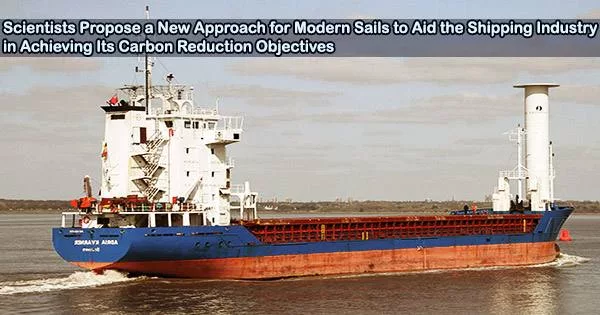Researchers have found a method to counteract the erratic and unpredictability of weather patterns that jeopardize efforts to reduce carbon emissions in the shipping industry.
Ship owners installing modern sails to cut down on carbon emissions are quite concerned about unpredictable weather. An increase in trust in sails as a decarbonization technique comes from new research from The University of Manchester that identifies operational strategies that potentially cut shipping emissions by up to 25%.
International shipping is thought to be responsible for 2-3% of the world’s annual carbon emissions, and since the Paris Climate Agreement’s cutoff point for carbon emissions is 50% below 2008 levels by 2050, the shipping industry urgently needs global action.
In the study, which was published in the journal Ocean Engineering, carbon emissions from more than 1000 ship departures from three major shipping routes were calculated. According to the findings, integrating contemporary sail technology with effective routing systems could increase the likelihood of carbon savings by employing a method that lessens uncertainty caused by erratic weather patterns.
This research provides an insight into which routes are most sensitive to changing weather forecasts when using wind propulsion and assesses a strategy that could help to mitigate the detrimental impact that unpredictable weather conditions can have.
Dr. Alejandro Gallego Schmid
Dr. James Mason, previously a postdoctoral researcher and now a visiting academic at the Tyndall Centre for Climate Change Research at The University of Manchester, said: “Current measures to reduce carbon emissions include fitting retrofit technologies, such as wind propulsion technology, where modern sails produce direct energy from the wind to reduce the power consumed by a ship’s engine. Weather routing is also used as an efficient routing system to allow a ship to deviate from standard shipping routes to search for new routes with more favourable winds.”
“Current academic methods assume a perfect foresight of future weather rather than accounting for unpredictable winds that are happening in real-time. This can detrimentally reduce the carbon savings from weather routing and could present a real challenge for the shipping sector when trying to meet its climate reduction goals.”
Dr. Alejandro Gallego Schmid, a Senior Lecturer at the Tyndall Centre for Climate Change Research, added: “This research provides an insight into which routes are most sensitive to changing weather forecasts when using wind propulsion and assesses a strategy that could help to mitigate the detrimental impact that unpredictable weather conditions can have.”
By updating weather and wind every 12 hours, the concept mimics the sector’s current routing techniques and enables ships to modify their paths in accordance with the most recent weather forecast.
The study simulated 1080 ship departures for eastbound and westbound trips in the North Sea, South Atlantic Ocean, and North Atlantic Ocean with travel times of up to 12 days in order to assess the technique.
The study discovered that the approach effectively decreased the uncertainty caused by unpredictability in the weather and demonstrated that sails and effective routing can result in annual carbon savings of up to 25%.
Although the strategy lessens uncertainty caused by unpredictability in the weather, it does not completely eliminate it. Under ideal circumstances, wind propulsion and effective routing can minimize carbon emissions by up to 29%, but weather uncertainty lowers these reductions by 10% to 20%. To fully comprehend how ships can actually reach these maximum reductions, more research is required.
Using wind propulsion and effective routing to reduce shipping emissions by up to 25% might have a significant positive impact on the industry.
The study provides a better knowledge of the possible carbon reductions that can be achieved using wind propulsion decarbonization technologies, without which the goals of the Paris Climate Agreement might no longer be within reach.
















